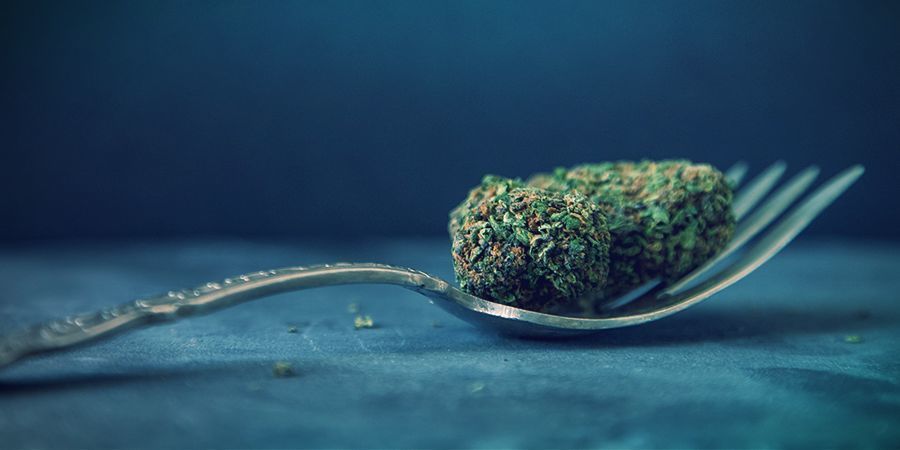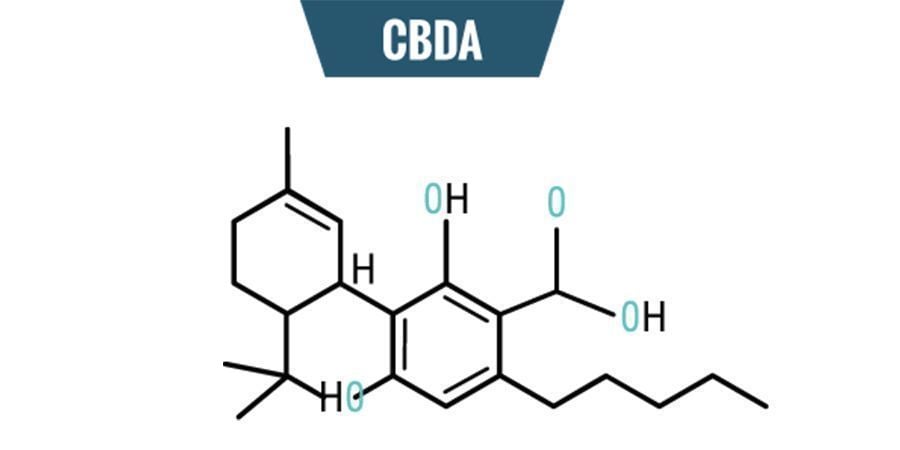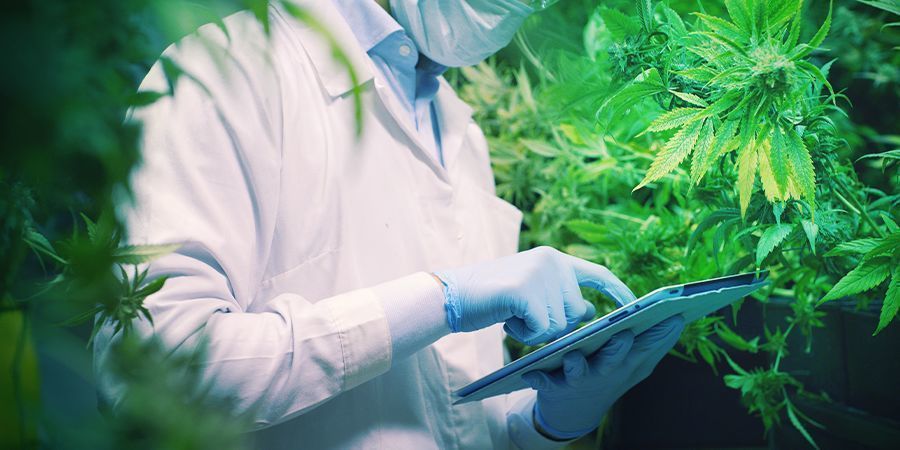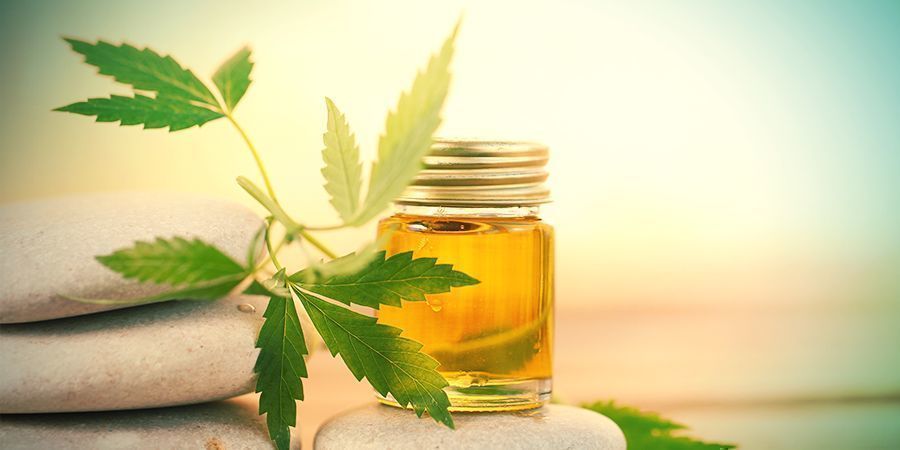
What Is CBDA And How Is It Different From CBD?
Cannabidiolic acid, otherwise known as CBDA, is a cannabinoid found within raw cannabis. Upon heat exposure or prolonged drying, CBDA is transformed into CBD. However, CBDA has been shown to have its own set of benefits, and may play an important role in the future of cannabis medicine.
Cannabis has been used by humans for thousands of years as a source of food and medicine. There’s even reference to the herb in the Ancient Chinese “ma”, a popular medicine that possessed both yin and yang qualities and dates back to 2900 BCE. The Egyptians also wielded cannabis as a treatment for glaucoma, inflammation, and enemas way back in 1213 BCE. The effectiveness of cannabis has truly stood the test of time, and it’s still used and prescribed to this day to help treat a large range of health conditions.
The advantage modern medicine has over that of our ancestors is a deeper and more thorough understanding of the chemistry of the herb. It’s now understood, thanks to decades of scientific research, that chemicals known as cannabinoids are responsible for many of the medicinal effects of cannabis. These include cannabinoids such as the psychotropic THC, and the non-psychotropic and highly medicinal CBD.
THE RECENT RISE OF CBD
CBD in particular has risen to immense popularity in recent years as it offers relief without any intoxicating side effects. This compound displays evidence of anti-inflammatory, antiseizure, antipsychotic, neuroprotective, antitumour, and antioxidant properties, among numerous others.
Today, the cannabinoid can be found far and wide in vape shops, supplement stores, and dispensaries. CBD operates in a multitude of ways within the body and is known to interface with the endocannabinoid system, a series of receptor sites found in the nervous system, immune system, and elsewhere.
WHAT EXACTLY IS CBDA?

Most cannabis enthusiasts are familiar with CBD, but what about cannabidiolic acid (CBDA), the acidic precursor to CBD? This cannabinoid is found within raw cannabis material prior to heating and processing. Although often overlooked, CBDA has been assessed in some scientific studies, and has been found to produce its own host of potential benefits.
CBDA occurs naturally within cannabis plants and begins life as the precursor cannabinoid cannabigerolic acid (CBGA). This precursor has the potential to be converted into either tetrahydrocannabinolic acid (THCA) or CBDA, depending on which enzyme acts upon it. If subject to the enzyme CBDA synthase, CBGA converts into CBDA.
CBDA is only present within the raw cannabis plant. You won’t be ingesting or inhaling CBDA via smoking, vaping, or eating cooked edibles. This is because the compound goes through a process known as decarboxylation when exposed to high temperatures. When heat is applied, a carboxyl group is removed from the molecule, leaving behind CBD.
Now that we’ve become more familiar with this interesting cannabinoid, let’s take a closer look at some of its potential medicinal effects. So far, no human trials have been conducted using CBDA.
However, the studies below give us insight into potential future uses of the cannabinoid.
1. CBDA DISPLAYS ANTI-INFLAMMATORY AND ANALGESIC EFFECTS

Much like its “future self” CBD, CBDA displays anti-inflammatory effects. A 2008 study[1] published within the journal Drug Metabolism and Disposition found that CBDA exerts its anti-inflammatory effects in vitro by working as an inhibitor of the enzyme cyclooxygenase-2 (COX-2). This enzyme is the target of nonsteroidal anti-inflammatory drugs (NSAIDs) in their attempt to treat inflammation and pain. COX-2 is expressed by cell types involved in inflammatory processes, and is involved in the synthesis of prostanoids, which play a role in acute and chronic states of inflammation.
CBDA achieves this effect due to its molecular structure, especially its carboxyl group. This trait makes it similar to various NSAIDs that achieve COX-2 inhibition, which also feature a carboxyl group in their chemical structure. In the lab, when this group was removed from CBDA via methylation, its ability to selectively target COX-2 was lost. This suggests that CBD, which occurs when this carboxyl group is removed, cannot target COX-2.
2. CBDA MAY BE EFFECTIVE AGAINST NAUSEA AND VOMITING

CBDA may have therapeutic potential against cases of nausea and vomiting. This trait may be particularly effective for reducing the side effects of certain medications, such as chemotherapy, which can stimulate nausea and ultimately reduce appetite.
A 2013 study[2] published within the British Journal of Pharmacology investigated the effects of CBDA on nausea-induced behaviour in rats and vomiting in shrews. The study revealed the CBDA displays greater effectiveness than CBD at inhibiting vomiting and nausea in animal models. The cannabinoid was also found to enhance 5-HT1A receptor activation, a serotonin receptor subtype.
The authors of this study concluded that CBDA displays great potential as a future treatment for nausea and vomiting, including anticipatory nausea, a condition for which no specific therapy currently exists.
3. CBDA HAS BEEN SHOWN TO HALT BREAST CANCER CELL MIGRATION IN VITRO

Perhaps one of the most important findings regarding cannabinoids is their potential to target cancer cells. Although cannabinoids such as CBD and THC have been found to be more effective at fighting breast cancer cells, it’s still interesting to note that CBDA has been shown to inhibit breast cancer cell migration within a petri dish.
A 2012 study[3] published within the journal Toxicology Letters found that CBDA is capable of inhibiting the migration of highly invasive MDA-MB-231 human breast cancer cells by inhibiting certain enzymes whilst simultaneously activating signalling pathways that stop the mobility of various cancer cells. Although this limited in vitro research is far from concrete and doesn’t reflect how CBDA would work against cancer in humans, it’s an interesting indication of what future human trials could show.
FUTURE RESEARCH WILL CARVE A PLACE FOR CBDA IN THE WORLD OF CANNABIS

It’s true that CBDA is overlooked by the cannabis world, which is somewhat justifiable due to the lack of solid clinical trials. However, the current research shows that there is still a lot to learn about this cannabinoid. As a precursor to CBD, many cannabis users may simply lump these two chemicals into the same category. But even early research shows that CBDA is capable of achieving outcomes that CBD can’t, hinting to a significant role in the future of cannabinoid therapies.
- D Bolognini, EM Rock, NL Cluny, MG Cascio, CL Limebeer, M Duncan, CG Stott, FA Javid, LA Parker, & RG Pertwee. (2013, March). Cannabidiolic acid prevents vomiting in Suncus murinus and nausea-induced behaviour in rats by enhancing 5-HT1A receptor activation - https://www.ncbi.nlm.nih.gov
- Shuso Takeda, Koichiro Misawa, Ikuo Yamamoto, & Kazuhito Watanabe. (2008/09/01). Cannabidiolic Acid as a Selective Cyclooxygenase-2 Inhibitory Component in Cannabis - http://dmd.aspetjournals.org
- Shuso Takeda, Shunsuke Okajima, Hiroko Miyoshi, Kazutaka Yoshida, Yoshiko Okamoto, Tomoko Okada, Toshiaki Amamoto, Kazuhito Watanabe, Curtis J. Omiecinski, & Hironori Aramaki. (2012/11/11). Cannabidiolic acid, a major cannabinoid in fiber-type cannabis, is an inhibitor of MDA-MB-231 breast cancer cell migration - https://www.ncbi.nlm.nih.gov
-
 4 min
8 August 2023
CBD Oil - Your Ultimate Guide
There are a plethora of CBD oils out there. Here, we look at everything you need to know when buying CBD oil online.
4 min
8 August 2023
CBD Oil - Your Ultimate Guide
There are a plethora of CBD oils out there. Here, we look at everything you need to know when buying CBD oil online.
-
 7 min
15 February 2022
What Is The Endocannabinoid System?
The endocannabinoid system is a fascinating network of channels and receptors that spans the length and breadth of the human body. Involved in everything from cognition and learning to appetite and...
7 min
15 February 2022
What Is The Endocannabinoid System?
The endocannabinoid system is a fascinating network of channels and receptors that spans the length and breadth of the human body. Involved in everything from cognition and learning to appetite and...
-
 9 min
2 September 2021
Understanding The Importance Of Different CBD:THC Ratios
The cannabis community is ripe with development and innovation. Breeders are now creating strains with diverse CBD:THC ratios, and scientists are urgently striving to discover their potential.
9 min
2 September 2021
Understanding The Importance Of Different CBD:THC Ratios
The cannabis community is ripe with development and innovation. Breeders are now creating strains with diverse CBD:THC ratios, and scientists are urgently striving to discover their potential.
-
 4 min
6 August 2021
How To Use CBD: Which CBD Product Is Right For You?
CBD is becoming an increasingly popular dietary supplement, yet for the unfamiliar, knowing the most suitable way to take CBD can be a challenge.
4 min
6 August 2021
How To Use CBD: Which CBD Product Is Right For You?
CBD is becoming an increasingly popular dietary supplement, yet for the unfamiliar, knowing the most suitable way to take CBD can be a challenge.
-
 2 min
8 August 2019
How Does CBD Affect Your Sex Life?
CBD oils, lotions, capsules, and lubes are being used pre-sex in an effort to enhance pleasure. Anecdotal reports claim the cannabinoid works wonders, but what does the research have to say?
2 min
8 August 2019
How Does CBD Affect Your Sex Life?
CBD oils, lotions, capsules, and lubes are being used pre-sex in an effort to enhance pleasure. Anecdotal reports claim the cannabinoid works wonders, but what does the research have to say?













 United States
United States











